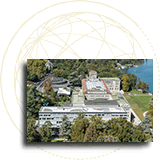UNDERSTANDING THE ฐฤรลม๙บฯฒสนูอ๘ืสมฯ:
THE ORGANIZATION
Special policies
The ฐฤรลม๙บฯฒสนูอ๘ืสมฯ’s main functions are to do with trade negotiations and the enforcement of negotiated multilateral trade rules (including dispute settlement). Special focus is given to four particular policies supporting these functions:
> Assisting developing and transition economies
> Specialized help for export promotion
> Cooperation in global economic policy-making
> Routine notification when members introduce
new trade
measures or alter old ones.
back to top
Assisting developing and transition economies
Developing countries make up about three quarters of the total ฐฤรลม๙บฯฒสนูอ๘ืสมฯ membership. Together with countries currently in the process of “transition” to market-based economies, they play an increasingly important role in the ฐฤรลม๙บฯฒสนูอ๘ืสมฯ.
Therefore, much attention is paid to the special needs and problems of developing and transition economies. The ฐฤรลม๙บฯฒสนูอ๘ืสมฯ Secretariat’s Training and Technical Cooperation Institute organizes a number of programmes to explain how the system works and to help train government officials and negotiators. Some of the events are in Geneva, others are held in the countries concerned. A number of the programmes are organized jointly with other international organizations. Some take the form of training courses. In other cases individual assistance might be offered.
The subjects can be anything from help in dealing with negotiations to join the ฐฤรลม๙บฯฒสนูอ๘ืสมฯ and implementing ฐฤรลม๙บฯฒสนูอ๘ืสมฯ commitments to guidance in participating effectively in multilateral negotiations. Developing countries, especially the least-developed among them, are helped with trade and tariff data relating to their own export interests and to their participation in ฐฤรลม๙บฯฒสนูอ๘ืสมฯ bodies.
> more on ฐฤรลม๙บฯฒสนูอ๘ืสมฯ training courses
back to top
Specialized help for exporting: the International Trade Centre
was established by GATT in 1964 at the request of the developing countries to help them promote their exports. It is jointly operated by the ฐฤรลม๙บฯฒสนูอ๘ืสมฯ and the United Nations, the latter acting through UNCTAD (the UN Conference on Trade and Development).
The centre responds to requests from developing countries for assistance in formulating and implementing export promotion programmes as well as import operations and techniques. It provides information and advice on export markets and marketing techniques. It assists in establishing export promotion and marketing services, and in training personnel required for these services. The centre’s help is freely available to the least-developed countries.
back to top
The ฐฤรลม๙บฯฒสนูอ๘ืสมฯ in global economic policy-making
An important aspect of the ฐฤรลม๙บฯฒสนูอ๘ืสมฯ’s mandate is to cooperate with the , the and other multilateral institutions to achieve greater coherence in global economic policy-making. A separate Ministerial Declaration was adopted at the Marrakesh Ministerial Meeting in April 1994 to underscore this objective.
The declaration envisages an increased contribution by the ฐฤรลม๙บฯฒสนูอ๘ืสมฯ to achieving greater coherence in global economic policy-making. It recognizes that different aspects of economic policy are linked, and it calls on the ฐฤรลม๙บฯฒสนูอ๘ืสมฯ to develop its cooperation with the international organizations responsible for monetary and financial matters — the World Bank and the International Monetary Fund.
The declaration also recognizes the contribution that trade liberalization makes to the growth and development of national economies. It says this is an increasingly important component in the success of the economic adjustment programmes which many ฐฤรลม๙บฯฒสนูอ๘ืสมฯ members are undertaking, even though it may often involve significant social costs during the transition.
back to top
Transparency (1): keeping the ฐฤรลม๙บฯฒสนูอ๘ืสมฯ informed
Often the only way to monitor whether commitments are being implemented fully is by requiring countries to notify the ฐฤรลม๙บฯฒสนูอ๘ืสมฯ promptly when they take relevant actions. Many ฐฤรลม๙บฯฒสนูอ๘ืสมฯ agreements say member governments have to notify the ฐฤรลม๙บฯฒสนูอ๘ืสมฯ Secretariat of new or modified trade measures. For example, details of any new anti-dumping or countervailing legislation, new technical standards affecting trade, changes to regulations affecting trade in services, and laws or regulations concerning the intellectual property agreement — they all have to be notified to the appropriate body of the ฐฤรลม๙บฯฒสนูอ๘ืสมฯ. Special groups are also established to examine new free-trade arrangements and the trade policies of countries joining as new members.
back to top
Transparency (2): keeping the public informed
The main public access to the ฐฤรลม๙บฯฒสนูอ๘ืสมฯ is the website, www.wto.org. News of the latest developments are published daily. Background information and explanations of a wide range of issues — including “Understanding the ฐฤรลม๙บฯฒสนูอ๘ืสมฯ” — are also available. And those wanting to follow the nitty-gritty of ฐฤรลม๙บฯฒสนูอ๘ืสมฯ work can consult or download an ever-increasing number of official documents, now over 150,000, in Documents Online.
On 14 May 2002, the General Council decided to make more documents available to the public as soon as they are circulated. It also decided that the minority of documents that are restricted should be made public more quickly — after about two months, instead of the previous six. This was the second major decision on transparency. On 18 July 1996, the General Council had agreed to make more information about ฐฤรลม๙บฯฒสนูอ๘ืสมฯ activities available publicly and decided that public information, including derestricted ฐฤรลม๙บฯฒสนูอ๘ืสมฯ documents, would be accessible on-line.
The objective is to make more information available to the public. An important channel is through the media, with regular briefings on all major meetings for journalists in Geneva — and increasingly by email and other means for journalists around the world.
Meanwhile, over the years, the ฐฤรลม๙บฯฒสนูอ๘ืสมฯ Secretariat has enhanced its dialogue with civil society — non-governmental organizations (NGOs) interested in the ฐฤรลม๙บฯฒสนูอ๘ืสมฯ, parliamentarians, students, academics, and other groups.
In the run-up to the Doha Ministerial Conference in 2001, ฐฤรลม๙บฯฒสนูอ๘ืสมฯ members proposed and agreed on several new activities involving NGOs. In 2002, the ฐฤรลม๙บฯฒสนูอ๘ืสมฯ Secretariat increased the number of briefings for NGOs on all major ฐฤรลม๙บฯฒสนูอ๘ืสมฯ meetings and began listing the briefing schedules on its website. NGOs are also regularly invited to the ฐฤรลม๙บฯฒสนูอ๘ืสมฯ to present their recent policy research and analysis directly to member governments.
A monthly list of NGO position papers received by the Secretariat is compiled and circulated for the information of member governments. A monthly electronic news bulletin is also available to NGOs, enabling access to publicly available ฐฤรลม๙บฯฒสนูอ๘ืสมฯ information.
